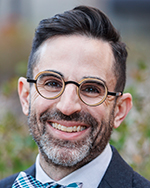Above: Rachel Rafael Neis. Detail from Untitled (Before Miskin), 2005. Oil on canvas. 18 in. x 24 in. Courtesy of the artist.

Warren Hoffman
I’ll admit it, I’m not the world’s most athletic person. I’d much rather go to the theater or read a book than climb on the StairMaster or lift weights. Yet I try to go to the gym on a fairly regular basis so I can to keep my body in healthy shape and ward off any variety of age-related maladies (how they seem to be piling up as of late) that might be heading my way. The interesting thing is, while I often find it difficult to get to the gym (New York’s never-ending cornucopia of wonderful entertainment distractions are quite alluring), once I’m there I typically enjoy my time and often feel better physically and have a clearer head when I leave. Exercise, in short, does do the body and mind good.
On that note, I’d like to talk about another body, a collective body, namely the AJS. As bodies go, we’re in pretty good shape. Our membership and conference numbers have stayed stable over the last few years, while some learned societies have struggled in these areas. Our board also regularly exercises the AJS body at its annual board meetings. They stretch the organization’s muscles in new ways, most recently with the announcement of a new three-year strategic plan that outlines what body parts we want to focus on in the future. And while we do stretch new muscles, we are careful not to overstretch and pull a muscle, by working hard to run a balanced budget to maintain stable fiscal health.
We also realize that sometimes we need to listen to other parts of the body we might have inadvertently ignored. Not infrequently, I will come home from the gym and feel sore in areas I didn’t even know I had! In the case of the AJS, one area we’re paying more attention to right now is contingent faculty. They’re continuing to make up an increasingly larger portion of the AJS body as more and more schools look to adjunct faculty to teach courses, rather than hire new tenure-track faculty. While the AJS doesn’t have any quick fixes or easy answers to address the contingent faculty issue, it is putting significant financial resources towards new professional development initiatives to help such individuals, as well as early-career scholars, navigate a diverse job market, including opportunities outside academia.
We’re also trying to exercise the AJS body so that we maintain symmetry of the body. No one likes “leg day,” but you still have to do it, otherwise you’re all arms and chest. In this vein, while the annual AJS conference is the largest program we run, it is far from the only thing we do. In fact, many members don’t know what the organization does on daily basis. The hardworking staff of six individuals administer and oversee a grant program for dissertation completion fellowships, produce an increasingly successful public-facing podcast series, book speakers at venues through our nationwide lectureship program, and offer new arts and culture grants to Jewish Studies programs in the United States. The organization aims to be the “heart” of Jewish Studies, to track and announce major events in the field, as well as tout the accomplishments and successes of our members. We provide webinars, mentorships, and other trainings (like our new partnership with the Op-Ed Project) to help our members stretch their professional muscles in new ways by learning new skills. We do all this while continually looking for new funding sources and donors to support this ever-increasing portfolio of services, because, as personal trainers like to say, you need to eat, if you want to grow. In the end, we’re not exercising just three days of the year at the conference, we’re always at the gym.
We look forward to rolling out a number of new initiatives in the coming weeks and months as part of our strategic plan, and hope that those of you who have the means to support this work beyond your membership dues will consider making a donation to the organization so we can further fund these programs and support our members. By working together and exercising the body in these ways, we’ll continue to be strong and healthy, and even grow in the coming years, and be in good shape to tackle any new challenges that may come our way.
Warren Hoffman
Association for Jewish Studies